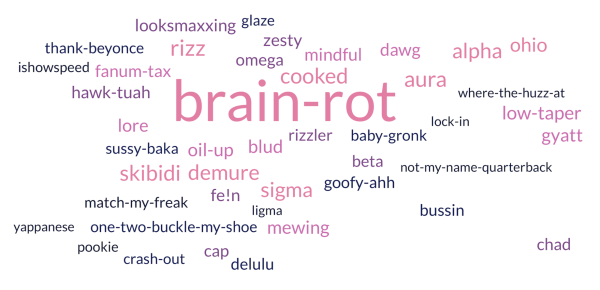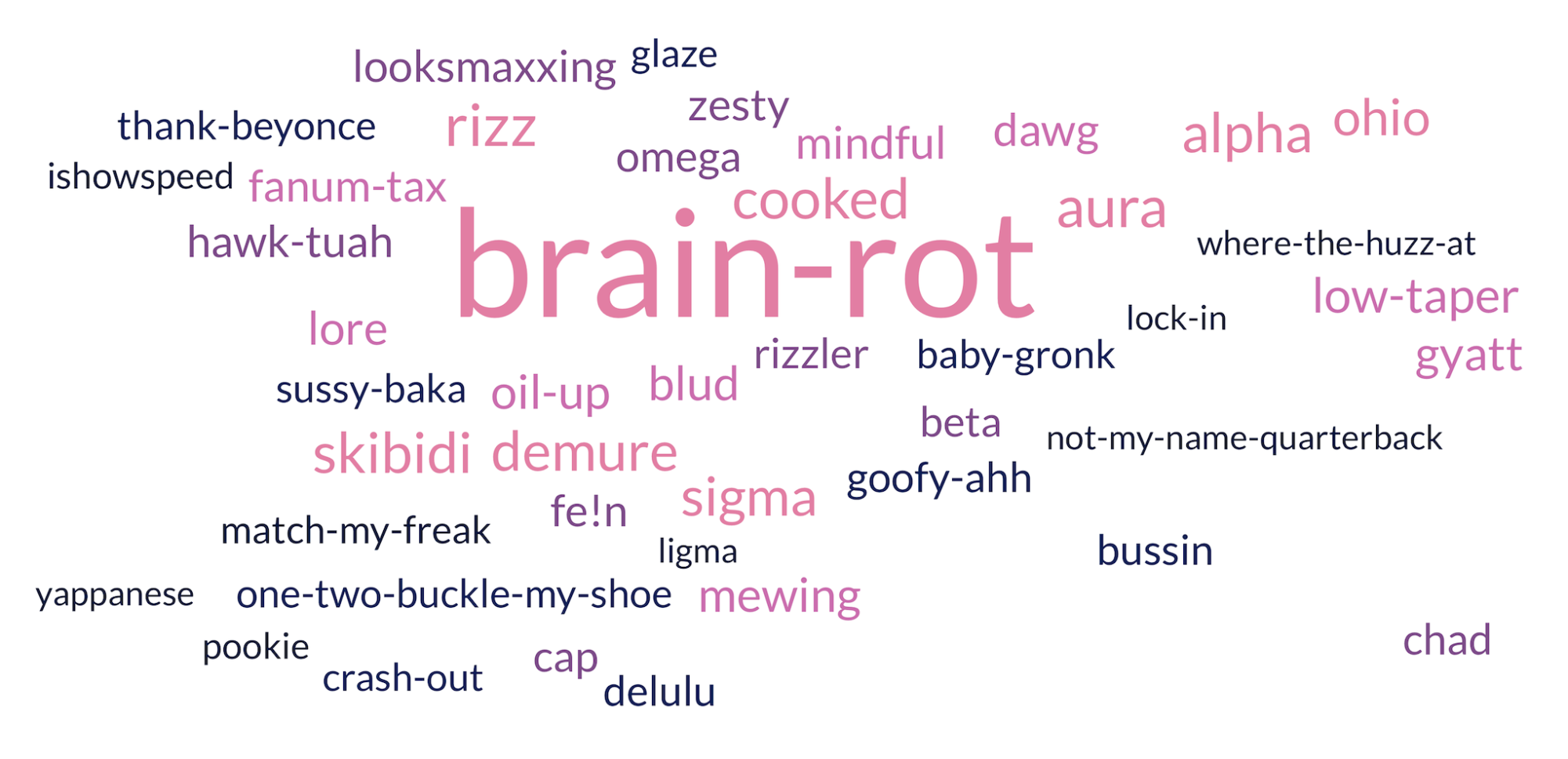Rizz. Demure. Sigma. Fe!n. Ohio.
There are hundreds of new slang phrases such as these. Behind each phrase is a meaning that only the younger generations fully understand. They are the signatures of the Generations Z (1995-2009) and Alpha (2010-2025) vocabulary, one filled with heaps of irony and mountains of absurdity, evolving at the speed of the internet.
And at the forefront of this linguistic shift? “Brain rot.”
As these new terms weave themselves into everyday conversations at Bishop’s, a bigger question emerges: how does brain rot shape interactions on campus? Is it a joke, or a deeper shift in how students communicate?
Defined by the Oxford University Press (OUP) as the “supposed deterioration of a person’s mental or intellectual state” due to excessive consumption of trivial content (especially online), brain rot has taken over the internet. Its usage frequency increased by an astounding 230% between 2023 and 2024, capturing the chaotic, seemingly unintelligent nature of Gen Z and Alpha’s vocabulary. Its impact was so widespread that the Oxford University Press officially declared the phrase the 2024 Word of the Year.
Sydney Mafong (‘26) was surprised that brain rot won. Looking back at past winners — “Rizz” (2023), “Goblin mode” (2022), and “Vax” (2021) — she noticed an interesting shift. “Older words reflected real-life events, but now it’s about internet culture,” she said. “If younger generations are shaping the Word of the Year, it shows how significant we are.”
Kiran She (‘28), however, wasn’t shocked. “The term was everywhere last year,” he said, “So what did you expect?” He added that its rapid spread across the internet made it an obvious choice, reflecting how our “perception of media as a whole” is changing — languages now evolve instantly online.
While there are different opinions about the Word of the Year, one thing is undeniable: brain rot — as a word and a phenomenon — is gaining prominence. Though brain rot originally referred to seemingly mindless online content, it has since evolved into something else entirely — a label for the way the younger generations speak.
Gen Alpha defined brain rot slightly differently. Luke Zierhut (‘29) defined brain rot as “words that are frequently used on the internet without specific meaning that originate from memes.” Cole Fetter (‘30) explained the reason these words are called brain rot is because “it’s so mindless that it’s funny.”
Latin and Ancient Greek Teacher Dr. David Banta is preparing for the next wave of brain rot-fluent students by adapting to their language. Unlike others, he sees the rise of brain rot purely as a linguistic change and not necessarily an intellectual phenomenon. “Every generation of people coming through a language is going to put their stamp on it,” he said. Dr. Banta smiled when recalling how words like “yeet” were once dominant with middle schoolers and have now faded away. “Some people talk about it as if it’s some kind of massive shift in the capacity of kids to think,” he said, “But every generation has their own linguistic business to take care of.”
From “boogie” in the ‘70s to “rad” in the ‘80s, “dope” in the ‘90s, and “swag” in the early 2010s, slang terms have always come and gone. Even more recent phrases like “on fleek” and “YOLO” have burned bright and disappeared just as fast. To Dr. Banta, brain rot is just another entry in the endless cycle of linguistic trends.
However, Sydney pointed out that what’s different about brain rot from the past slang terminology is that some of the words don’t even have an actual meaning. Words like “rad” and “tubular” in the ‘80s expressed excitement, while “sick” in the 2000s meant something impressive. Even internet-born phrases like “YOLO” (You Only Live Once) and “on fleek” (perfectly styled) have clear definitions. In contrast, modern brain rot expressions exist more as a shared joke than an actual form of communication.
As an older sibling who acquired the language from her two twin 11-year-old brothers, Sydney often struggles to define certain words: “If you ask my brother what ‘skibidi’ means, he probably doesn’t even know… and neither do I.” Instead of expressing actual specific ideas, phrases like “what the sigma,” “skibidi,” or “Ohio” act as exclamations — placeholders for emotion rather than precise meaning.
Brain rot, surprisingly, can sometimes be used as an icebreaker. “Brain rot is a very versatile set of words,” Maggie Hao (‘28) said. “When there is a tense situation, I find myself using brain rot to lighten the mood — it usually works pretty well for people my age.”
Lukas Sieffert (‘27), on the other hand, disagrees with the appeal, arguing that its lack of meaning makes conversations feel shallow. “I hate it when someone I’m trying to get an actual response out of is just like ‘real,’” he said. “This is funny ironically, [but it] hurts when it’s actually bad for conversation.” For instance, Lukas has trouble communicating with people in his grade, it takes him some time to catch up to the language especially when the “new trends” come out.
While some argue that this is just the latest form of teenage expression, others worry it might create language barriers. If the goal of communication is comprehension, what happens when an entire section of words doesn’t carry actual or relevant meaning? Does this worsen the divide between generations?

For Dr. Banta, the concern lies not in the words themselves but in the speaker’s control over their language. He values students’ ability to shift between informal and formal speech — an ability that he believes is intact, at least for now. “If they were using it for an effect and the effect worked, I would find it very pleasing,” he explained. “If they found themselves incapable of removing themselves from the dialect, then I would see that as an incapacity to control their [language].”
Sydney retains this control, sharing how her language naturally changes depending on her audience. “It’s almost subconscious. When I’m talking to teachers and parents, I don’t even think about it — I automatically avoid using brain rot phrases. But when I’m with friends, I just find myself using that kind of language without even realizing it.”
Maggie reinforced this idea, “I don’t use it when communicating with people from older generations,” she said. “I find myself using it more in a satirical way when I’m around my friends.”
Luke and Cole have this control as well. They claimed that brain rot has never caused miscommunication because they only use it with their friends, not adults. “We don’t normally use brain rot with teachers or parents,” Luike said. Cole added, “If we use it with parents, they just don’t understand, so it’s pointless.”
Perhaps that is why sixth grade English Teacher Ms. Kate Sugar hasn’t noticed any serious brain rot with her students. “Sixth graders seem to understand the difference between informal chat and formal writing, and I haven’t seen any drop in their vocabulary or writing skills,” she said.
So brain rot — love it or hate it — is how the younger generations now talk. It’s undeniably shaping the way we communicate, whether or not the rest of us can keep up. Regardless, one thing’s for sure: language, like the internet, never stands still. It’s evolving, decaying, and regenerating at the same time.
And honestly? …It’s kind of skibidi.









